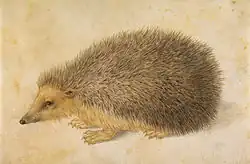єжъ
Old Ruthenian

єжъ
Alternative forms
- ѣжъ
Etymology
Inherited from Old East Slavic ѥжь (ježĭ), from Proto-Slavic *ežь, from Proto-Balto-Slavic *eźis, from Proto-Indo-European *h₁eǵʰis (“hedgehog”).[1][2][3] Cognate with Russian ёж (jož), Old Polish jeż.
Descendants
- Rusyn: ї́жо (jížo)
- ⇒ Rusyn: ї́жко (jížko)
- Ukrainian: їж (již), йіж (již), іж (iž), їжо́ (jižó), іжо́ (ižó), ож (ož) (dialectal)
References
- Trubachyov, Oleg, editor (1979), “*ežь”, in Этимологический словарь славянских языков [Etymological Dictionary of Slavic Languages] (in Russian), issue 6 (*e – *golva), Moscow: Nauka, page 37
- Melnychuk, O. S., editor (1985), “їж”, in Етимологічний словник української мови [Etymological Dictionary of the Ukrainian Language] (in Ukrainian), volume 2 (Д – Копці), Kyiv: Naukova Dumka, page 323
- Rudnyc'kyj, Ja. (1972–1982), “їж”, in An Etymological Dictionary of the Ukrainian Language, volume 2 (Д – Ь), issue 12–22, Ottawa: Ukr. Mohylo-Mazepian Acad. of Sci. & Ukr. Lang. Assoc., →LCCN, page 567: “OUk., OES. єжь”
Further reading
- Zhurawski, A. I., editor (1989), “ежъ”, in Гістарычны слоўнік беларускай мовы [Historical Dictionary of the Belarusian Language] (in Belarusian), issue 9 (дорогоценный – жеребей), Minsk: Navuka i tekhnika, →ISBN, page 181
This article is issued from Wiktionary. The text is licensed under Creative Commons - Attribution - Sharealike. Additional terms may apply for the media files.